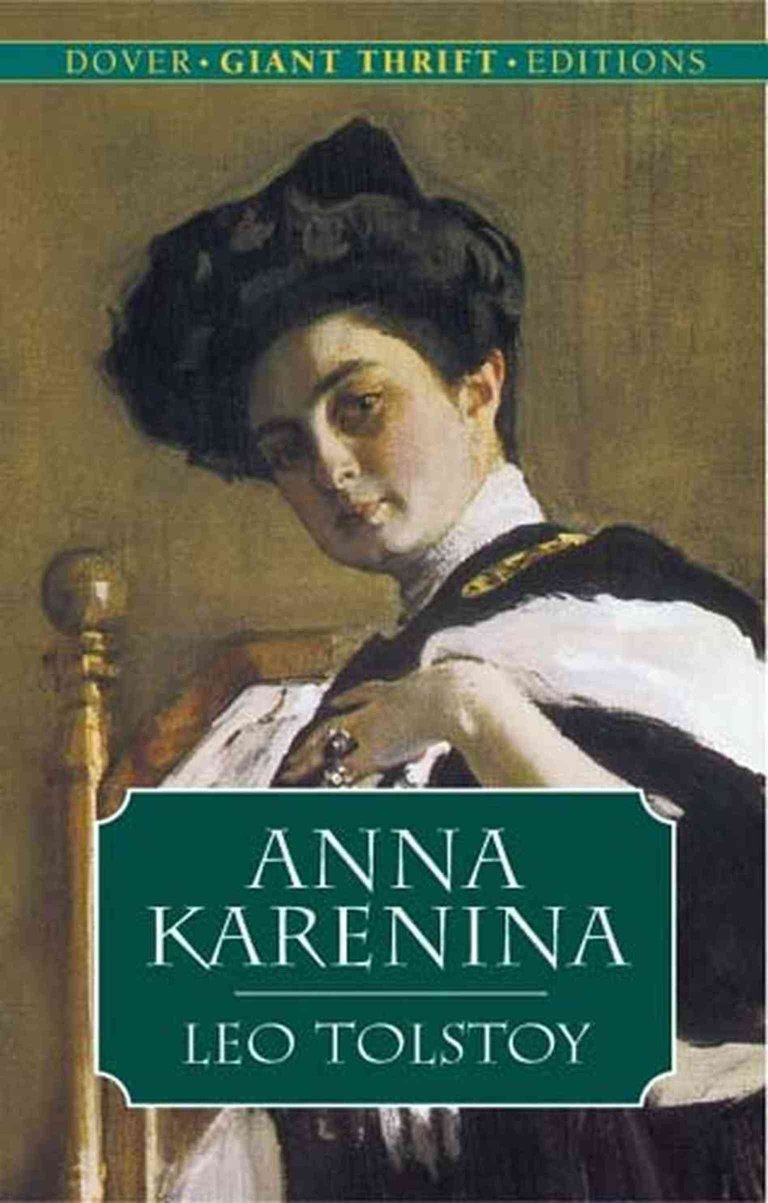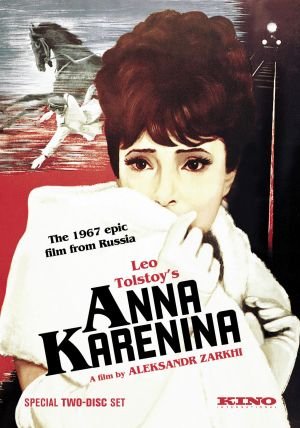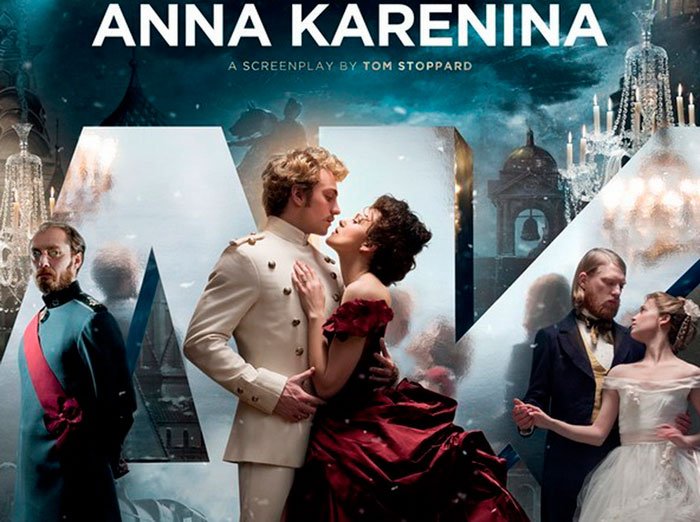Hello!
I continue to write about the Russian literature. I mentioned a dystopian novel "We" written by Zamyatin which is not very popular. Unfortunately. Let's talk about the novel "Anna Karenina" written by Leo Tolstoy.
Image source
We read this book at school in Russia, but I believe that this is an incomprehensible book for teenagers. I read it in my youth and in adulthood and every time I treated it differently. Every reader has his own "Anna Karenina". I mean, everyone treats her actions differently. Someone pities her, someone thinks she's a stupid woman. But I agree with the fact that Anna's story will not leave anyone indifferent.
Plot: Arriving in Moscow, Anna meets her fatal love - a young officer, Count Vronsky. She fell in love at first sight, the world ceased to exist. Anna leaves for Petersburg, to her husband and son. But the young count aspires after his new love.
I must say that I am not a huge fan of this novel. However, I can not but admit that "Anna Karenina" is the image of the Russian soul, the nature of a Russian man, who constantly wanders about in search of life meaning and is simultaneously trapped in the struggle for survival.
Leo Tolstoy is really a good psychologist. He immerses the heroes in the abyss of despair. They lose ground and it affects their actions and lives. At the very beginning of the book, Anna leaves the train and this step is the first step to her death. The novel atmosphere is hideous and cold. The atmosphere of pretense and lack of heat, artificial, created life is dictated by the society to which the heroes belong. Tolstoy accurately portrayed the moment in which Russia lived from the 1870s of the XIX century until 1905, before the first revolution began.
Leo Tolstoy loves to teach. The reader is disastrously prevented from thinking. Tolstoy himself will tell all the motives, all the consequences, ask all the questions and answer them by himself. And sometimes reading becomes boring because of such submission of information.
"Anna Karenina" is a beautiful novel about all the vicissitudes of love. This is a story not only about adultery but about different relationships between people. At the beginning, we meet not Anna and not even her lover Alexei, but Stepan Arkadyevich, Anna's brother. The author plunges from the first pages into the problems of the Oblonsky family, the husband cheated his wife and suffers at the same time. During the whole novel it is interesting to watch this pair, and with each page, Stepan Arkadevich falls more and more, turning into a person not worthy of sympathy. His wife Darya "Dolly" Alexandrovna was burdened with all the hardships of their family life: the upbringing of children, the maintenance of the house. At the same time, the husband is interested in women and endless entertainments. He spends lots of money and doesn't think about his family.
Lyovin is one of the few positive characters in the book. He lives in the countryside, dreams of a loving wife, children and the simple life of a village peasant. He is not perfect but he causes a respect.
Anna Karenina, a beautiful woman, has a husband, a child and importance in society. It seems her life is a dream. She feels sorry of cheating. Her husband Alexei Alexandrovich, a high-ranking person, an important person in the state. His life is devoted to working. Wife and son mean a successful completion of the task. His character can be compared with a withered piece of bread, he does not feel love for his wife and son. His opponent is Alexei Vronsky, I can not say anything good or bad about him. His love is not clear to me. His feelings as quickly flare up, I think also quickly and go out. Whether Anna is free at the beginning, who knows if their romance would last so long.
One of the critics wrote:
"The characters in Tolstoy's novel are too lively, too complex, too indefinable, too dynamic - and, moreover, each of them is too full of its own unique, indescribable but clearly audible soul melody ".
This novel is many-sided. It tells not only about unhappy love but also touches upon many questions that we are afraid to ask ourselves. Many readers think that this is a book about death. But in my opinion, this is the book about the desire to live. Anna's death was that she lived only for her own needs. If there was no Vronsky in her life, I'm afraid that the result would be the same.
Some interesting facts:
- "Anna Karenina" is a part of the World Library consisting of 100 best books of all time and peoples. A hundred writers from fifty-four countries took part in drawing up the list. The list was compiled in 2002 by the Norwegian Book Club (Bokklubben in cooperation with The Norwegian Nobel Institute.
- Appearance of Anna Karenina is drawn from Pushkin's daughter Maria Gartung. Anna also got her favorite purple dress and a necklace of large pearls.
- The novel begins with the phrase: "All happy families are alike, each unhappy family is unhappy in its own way." On the basis of this aphorism, the so-called the Anna Karenina principle is derived, which is used to describe systems in different sciences. For example, Jared Diamond explains why so few animals were tamed by man - for the successful domestication it is necessary to coincide several factors, and the absence of one of them makes domestication impossible. Economists use the Anna Karenina principle, speaking about the adaptation of systems to the external environment and their behavior during a crisis: all well-adjusted systems have the same features, and all non-adapted systems do not cope with adaptation each in its own way.
Famous screen adaptations
1. Anna Karenina, 1935
Cast: Greta Garbo, Fredric March, Freddie Bartholomew, May Robson.
Image source

2. Anna Karenina, 1948
Cast: Vivien Leigh, Ralph Richardson, Kieron Moore, Mary Kerridge
 Image source
Image source
3. Anna Karenina, 1967, USSR
Cast: Tatiana Samoilova, Nikolai Gritsenko, Vasili Lanovoy, Yury Yakovlev
 Image source
Image source
4. Anna Karenina, 2012
Cast: Keira Knightley, Jude Law, Aaron Taylor-Johnson, Matthew Macfadyen, Alicia Vikander
 Image source
Image source
Don't forget to read my posts about:





Потом почитаю, пока репост
да не надо репостить. от этого плюсов никаких. не захламляй страницу)
Никто не читает, так что можно захламлять)
замечательная русская классика, я рада что имела возможность вырости с такими романами. Спасибо что напомнила школьные годы
да, я и в школе и во взрослой жизни читала. И каждый раз по-разному отношение было. В школе конечно не понимала её поступка
True classic) It was hard for me to read the book. If my memory doesn't fail me I may have even missed pages when it got too boring and heavy on the monologues. You're right about Tolstoy being too opinionated and not giving a chance for a reader to decide how he/she wants to see the character, likable or not.
I've found a review today. A woman writes that she fell asleep several times during the reading))))
I can feel her pain)
Another big book that's been on my to-read pile for too long. With these Russian masterworks, my ambition is always checked by the realization that I'll be spending a lot of time in some very dark places.
In this way she's a very 21st century heroine - a lady ahead of her time!
This is absolutely fascinating. I've never thought about social systems in terms of evolutionary adaptation to circumstances before. And it really should give one pause when thinking of altering architecture, living arrangements, social structures, &ct. Maybe there's a reason that we have the traditions that we do.
Thank you for this thought-provoking review!
I was surprised too when I found out)))).Yeah, you can read about this principle here - https://en.wikipedia.org/wiki/Anna_Karenina_principle
Awesome - thanks for the link!